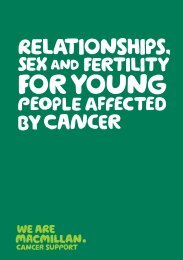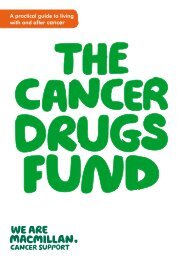Understanding chemotherapy - Macmillan Cancer
Understanding chemotherapy - Macmillan Cancer
Understanding chemotherapy - Macmillan Cancer
You also want an ePaper? Increase the reach of your titles
YUMPU automatically turns print PDFs into web optimized ePapers that Google loves.
<strong>Understanding</strong> <strong>chemotherapy</strong>If you have children, ask for help looking after them whenyou have <strong>chemotherapy</strong> and for a couple of days after.Some people may need extra childcare help and a socialworker can usually arrange this for you. We have a factsheet about childcare that we can send you.Make sure you get plenty of rest. But try to take some gentleexercise, such as short walks or more if you feel up to it,as well. This will give you more energy and helps to keepsome of your muscles working.Some people choose to, or need to, carry on working during<strong>chemotherapy</strong>. Most employers will reduce your hours andchange work duties to make things easier for you.If you’re having difficulty sleeping, we have a fact sheetabout managing sleep problems.The tiredness will get easier when <strong>chemotherapy</strong> is over.But it can be three or four months until you feel back tonormal. Some people find that they still feel tired a yearor so afterwards.Our booklet Coping with fatigue has helpful tipson dealing with tiredness during <strong>chemotherapy</strong>.Skin and nail changesYour skinSome drugs can affect your skin. It may become dry or slightlydiscoloured. Chlorine in swimming pools can make this worse.Your skin may also be more sensitive to sunlight, during andafter treatment.58
















